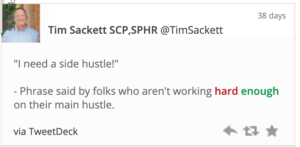Have you ever been caught in a downward vortex of a truly crappy idea that at some point you wondered to yourself, “how the heck did we get here!?”
I like to think I’m the kryptonite of bad ideas in my organization. It’s part of my personality of being a bit unfiltered in my thoughts and ideas. If I think something is a bad idea, I’m probably going to say something. Or at least, I hope I will say something.
Why don’t we stop bad ideas in organizations?
- We never want to tell someone their idea is bad. We say things like, “there are no bad ideas!” Of course, there are bad ideas! That’s just a dumb statement. There are ideas that can ruin your company and your career. If some idiot opening shares a bad idea, it should be up to us as peers to point this out and help them out.
- The person sharing the idea is in a power position. This one is hard. Well, Tina is the boss! I don’t like her idea, but we have to go along with her or else it will probably look bad and she’ll make sure she crushes my career. This is the worst! If you’re a leader, you need to find someone who will tell you the truth about your stupid ideas.
- We all know it’s a bad idea but we’ve got so much already invested we need to make it work. Ugh! My grandmother would call this, “throwing good money after bad”. Well, we’ve come this far, we have to make it work. The best organizations know when to call it quits on a bad idea, take the loss, and begin a new in a better direction.
So, bad ideas grow and prosper basically because we don’t want to hurt feelings or hurt our own careers.
I do think there are some strategies we can use to help get us out of a bad idea. Some things that will allow us to protect our relationships and our careers, and put us on a better path.
If I think of the times that I saw someone’s bad idea blow up in their face, it happened because it was done publicly. If we have the ability to sit down privately with the individual and talk through it, I usually find that together we can create something better, and change a bad idea into something that will work, and it saves face for all involved.
In terms of people in the position of power who have bad ideas, I like, again, speaking to them in private, but also using data and competitive data to try and influence their decision in another direction. I’ve also used a strategy that is a bit risky, but it’s going over their head in a way that seems like you weren’t doing it on purpose. Like, “Oh, I want to share this data with the entire company because I found it so fascinating and thought others would have interest!” Data that shows we should be doing something else, in hopes, it sparks an idea for someone to change.
The reality is bad ideas happen every day in our organizations and it’s up to us to help create a culture where we reward stopping bad ideas. Where we respect each other so highly we are confronting bad ideas as a way to help that person’s career, not point out their failure. If we can get to that point, we put ourselves in a position to take the power out of bad ideas!

